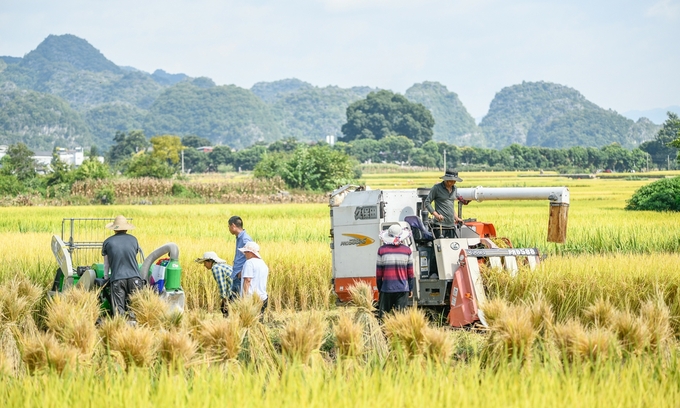June 3, 2025 | 18:19 GMT +7
June 3, 2025 | 18:19 GMT +7
Hotline: 0913.378.918
June 3, 2025 | 18:19 GMT +7
Hotline: 0913.378.918

Farmers harvest paddy rice in Xingyi, Southwest China's Guizhou Province on August 30, 2022. Photo: VCG
Ye Xingqing, a senior expert at the rural economy center of the Development Research Center of the State Council, made the remarks at an international forum discussing the development and investment of grain supply chains during the 2022 China International Fair for Trade in Services.
Over the past decade, China's grain production has been climbing while grain imports have also been increasing. In 2021, the country produced 680 million tons of grain, an increase of 70 million tons from 10 years ago. Meanwhile, its grain imports also reached 164.54 million tons last year, including 90 million tons of soybeans, according to media reports.
Ye noted that moderate imports are important to ensure China's food security due to the increasing volatility of global food prices as well as some countries' restrictions on food exports.
"Some foreign media outlets may make something out of China's grain imports, alleging that the country's grain stocks have pushed up international food prices," Ye said, noting that China's imports do not steal others' rice bowls.
China's soybean imports, for example, have continued to grow for more than 20 years, while the global share has reached 60 percent. However, imports from other countries are also growing. "China's soybean trade is characterized by typical incremental trade, indicating that the country is not crowding out other countries' market shares or threatening others' imports," according to Ye.
Since June last year, food prices have risen by more than 15 percent in 51 countries, and are expected to remain high by 2023, Alex Marianelli, Director of Supply Chain for the United Nations World Food Programme, said during the forum. Alex noted that the reasons for soaring food prices include the rising cost of cultivation, export restrictions in some countries as well as reduced food production due to extreme weather.
"Saying that China steals others' rice bowls is simply nonsense," Jiao Shanwei, editor-in-chief of industry news website cngrain.com, told the Global Times on Sunday that after the food shortage of 2008 and 2012, the importance of food security has become a consensus of all countries worldwide.
China has a large population and food security has always been a top priority, so the country's domestic food stocks have been relatively adequate, which is in line with national conditions and population structure, as well as economic development needs, Jiao noted.
Ye said that China's grain stocks and its high global share are the result of imports overlaid during the global food price downturn in the past few years as well as the nation's growing domestic grain production.
"In the last two years, China's stocks of major grain varieties and global share have been declining, which is the country's contribution to maintaining global food security by releasing stocks to ease the pressure on global food supply," Ye noted.
In terms of the hot climate that countries worldwide are facing this summer, Alex said that droughts in some grain-exporting countries could also lead to decline in grain production, which may further push up global food prices.
China also underwent droughts in the south including Southwest China's Sichuan Province due to continuous heat waves.
"The natural disasters will have little impact on China's autumn grain harvest or the country's food imports despite potential output reduction of some dryland crops," Jiao said, as the country is fully able to achieve 100 percent self-sufficiency in wheat and rice.
(Global Times)

(VAN) Vikas Rambal has quietly built a $5 billion business empire in manufacturing, property and solar, and catapulted onto the Rich List.

(VAN) Available cropland now at less than five percent, according to latest geospatial assessment from FAO and UNOSAT.

(VAN) Alt Carbon has raised $12 million in a seed round as it plans to scale its carbon dioxide removal work in the South Asian nation.

(VAN) Attempts to bring down the price of the Japanese staple have had little effect amid a cost-of-living crisis.

(VAN) Fourth most important food crop in peril as Latin America and Caribbean suffer from slow-onset climate disaster.

(VAN) Shifting market dynamics and the noise around new legislation has propelled Trouw Nutrition’s research around early life nutrition in poultry. Today, it continues to be a key area of research.

(VAN) India is concerned about its food security and the livelihoods of its farmers if more US food imports are allowed.